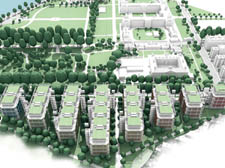| |

The vision for the barracks site is now
being revisited, but what about affordable housing? |
A ‘poor’ Tory homes policy
In the wake of the architecture row over plans for the Chelsea Barracks site, Paul Dimoldenberg makes the case for local people to have local homes
PRINCE Charles and Lord Rogers have been in the news this week following the dramatic withdrawal of the Chelsea Barracks redevelopment plans.
Important as design considerations are, I have no intention of siding with either of these eminent men over the different architectural approaches they each favour.
Now that the landowners have gone back to the drawing board, my concern is to ensure that whatever is finally built on the huge Chelsea Barracks site provides for all the community and not just the wealthy few.
The planning brief for the site makes it clear that 50 per cent of the housing on the site should be affordable and that the community benefits need to include open space and a range of health, leisure and social facilities.
However, as readers will have noticed, there are those on the Conservative side at Westminster City Council who believe that affordable housing has no place in the West End any more.
They argue that the land in the West End is too expensive to build social housing and it would be much cheaper to build elsewhere, like outer London or further afield.
Their argument is that you can build more houses for poorer people elsewhere for the same money.
Of course, this superficial argument will have its supporters but it really is a flawed argument and does not stand up to serious scrutiny.
First, there is a huge need to provide affordable homes for people on low incomes whose families have lived in the West End for generations.
These low-income residents have been keeping the West End going by working in the shops, public services and businesses which are vital for the West End economy.
Why should they be told that if they want to move out of overcrowded accommodation they have no alternative but to move to outer London, away
from their families and friends?
And if their jobs are in the West End why should they be forced to make a long commute?
Second, when you add up all the other costs, is it really cheaper to build elsewhere?
What about the cost of the extra school places and health facilities that will be required elsewhere?
And will the outer London boroughs welcome Westminster’s social housing estates being landed in their patch?
Outer London Conservative boroughs (and their Conservative-voting residents) might not take too kindly to having to accept Westminster’s housing “exports”.
And third, do we really want a West End which is the preserve of only the wealthy who can afford high property prices?
One of the attractions of London has always been that it is so diverse, with rich and poor living cheek-by-jowl.
This has encouraged tolerance and understanding. It has made London a place for everyone and has contributed to its social and economic success.
The Victorians had no problem building housing for the poor in Mayfair and Belgravia.
Indeed, the city fathers had no worries about building council housing in the West End, despite high property values.
It was the natural thing to do.
But now we have a new breed of Conservative councillors who, in the words of Oscar Wilde, “know the cost of everything and the value of nothing”.
Because people on low incomes, by and large, don’t vote Conservative, the Conservatives have little interest in people on low incomes.
And that’s the real reason the Conservatives may well argue that any affordable housing should be built outside Westminster.
Rest assured, however, that Labour councillors will continue to make the case for a genuinely mixed community at Chelsea Barracks.
•
|
 |
|
|
 |
| |
| |